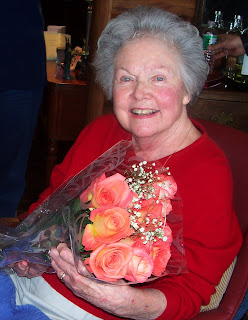
Due to the passing of my BELOVED mother-in-law, Mary Lee, I haven't been able to keep up with the Tangled Ball blog for the past few days.
But today, I have two experts to discuss. One was 11 in 1935 and the other is 11 in 2010.
There's a title of a book written about 30 years ago called The Little Girl with the Grandmother Face. It reminds me so much of Mary Lee. With her usual enthusiasm, she told me a few months back that she was happy with Tangled Ball's effort to engage parents and all adults in the conversation about everyday bullying solutions. Always bubbly and upbeat, I was surprised when she turned serious. She told me that she had never forgotten how she was the "bully" for a brief time and how she still felt bad when she recalled making a little girl in her class feel left out. With great clarity, she told me how the girl's mother talked to her one day and asked her to be kinder and what an impact that made on her life.
If you met her, any thought that she could ever be mean would come as a huge surprise because Mary Lee is the greatest example of unconditional love.
I'm so grateful that she shared it and it's just one of the hundreds of things that she taught me. There are three good-- and ageless -- lessons in this story alone:
• The first is that almost every child tries to "flex their muscles" to feel more powerful even at young ages.
• When an adult steps in and handles it correctly, the lesson is often heard.
• Never let a child continue to be mean. Even nice kids try it and nice kids, especially, feel bad for a very long time.
And actually, there's a fourth:
• Take time for real conversations with people you love. You never know what you'll learn.
The second expert's name is Matt. When he started middle school this year, he noticed a boy in his class who had some difficulty walking. This reminded Matt of his uncle, John Paul, from Ireland who has cerebral palsy. When Matt came home he and told his mom about his fellow student, his mom nervously asked him, "You didn't say anything about the cerebral palsy to him, did you?"
Matt said "No, I just told him if he needed anything, I'd be his friend."
The lesson here? Follow Matt's lead.








